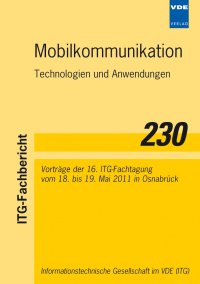Uplink Radio Resource Management Challenges in LTE-Advanced Relay Networks
Conference: Mobilkommunikation 2011 - Technologien und Anwendungen - 16. ITG-Fachtagung
05/18/2011 - 05/19/2011 at Osnabrück, Deutschland
Proceedings: Mobilkommunikation 2011
Pages: 6Language: englishTyp: PDF
Personal VDE Members are entitled to a 10% discount on this title
Authors:
Bulakci, Ömer; Bou Saleh, Abdallah; Redana, Simone; Raaf, Bernhard (NSN Research-Radio Systems, Nokia Siemens Networks, Munich, Germany)
Bulakci, Ömer; Bou Saleh, Abdallah; Hämäläinen, Jyri (Aalto University School of Electrical Engineering, Espoo, Finland)
Abstract:
Relay enhanced networks are expected to fulfill the demanding coverage and capacity requirements in a cost-efficient way. Type 1 inband relaying is now being standardized as an integral part of 3GPP LTE-Advanced. This type of relay nodes supports a relaying mode where the relay link transmission is time-division multiplexed with the access link transmission, whereas macro users share the same resources with the relays. Hence, system performance depends strongly on the resource sharing strategy among and within the links as well as how well the competition on resources is managed at the eNB. Besides, in order to fully exploit the benefits of relaying, the inter-cell interference, which is increased due to the presence of relay nodes, should be limited via a proper power control scheme on each link. Therefore, an optimization of resource sharing in conjunction with power control strategy is urged to enhance the overall performance of the relay networks. In this work, performance evaluation of various resource sharing and power control optimization strategies is carried out within the LTE-Advanced uplink framework in urban and suburban scenarios. Furthermore, the challenges pertaining to radio resource management in relay deployments are addressed.


